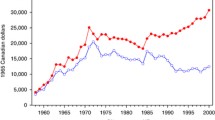Abstract.
For the first time, this paper uses a panel data set, the British Household Panel Survey, to analyse saving behaviour in Britain. One objective is to test the precautionary saving hypothesis, according to which households save to self-insure against uncertainty. Our results show that in accordance with this hypothesis, various measures of uncertainty based on earnings variability have a statistically significant effect on households' saving decisions. Moreover, in accordance with the life cycle model, households save more if they expect their financial situation to deteriorate.
Similar content being viewed by others
Author information
Authors and Affiliations
Additional information
Received: 15 June 1999/Accepted: 4 January 2001
Rights and permissions
About this article
Cite this article
Guariglia, A. Saving behaviour and earnings uncertainty: Evidence from the British Household Panel Survey. J Popul Econ 14, 619–634 (2001). https://doi.org/10.1007/s001480100081
Issue Date:
DOI: https://doi.org/10.1007/s001480100081




